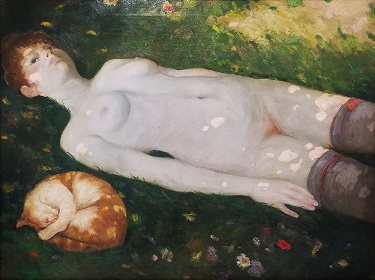

ANTIQUE PRINTS
James Roy HOPKINS (American, 1877-1969)
James Roy HOPKINS (American, 1877-1969)
James Roy Hopkins (1877-1969) was born in the rural farming community of Irwin, Ohio in 1877. His mother, Nettie Hopkins,
painted with watercolors recreationally and encouraged her son’s artistic interests. Though he shared his mother's love of art,
Hopkins initially entered Ohio State University in 1896 to study electrical engineering. However, he soon left and briefly
enrolled in the Columbus School of Art before going to the Art Academy of Cincinnati where he studied with Frank Duveneck.
In 1900, Hopkins moved to New York City and worked as a medical textbook illustrator. Two years later he made the pilgrimage
to the art center of the western world at the time, Paris, France.
While in Paris he improved his craft at the Académie Colarossi. Hopkins embraced Parisian life and socialized with and visited the studios of such great artists as Pierre August Renoir, Claude Monet, and Edgar Degas. These artists had a significant impact on Hopkins, and many aspects of Impressionism were retained throughout his career. As a result his art became less detailed with looser brushwork and more emphasis on lighting. In 1904, Hopkins returned to Ohio to marry a fellow classmate from the Art Academy of Cincinnati, Edna Boies, an accomplished printmaker. He soon returned to Paris with his wife and they traveled throughout Europe, Asia, and Northern Africa. In 1914, the outbreak of World War I forced the couple to return to Ohio, where Hopkins accepted a teaching position at the Cincinnati Academy of Art.
While teaching at the Academy, the Hopkins began to spend their summers in the nearby Cumberland Mountains of Kentucky. From 1915 to 1917, the artists set up a studio at an inn and befriended the local mountain people. Perhaps due to his own rural upbringing, James felt a connection to the isolated families and slowly earned their trust. His compassionate portrayals of the Cumberland Falls community make up his most well known series of works. The subjects are shown truthfully with the evidence of their hard lives visible on their faces, but Hopkins was also sure to portray them with respect and dignity. These paintings of Appalachia and Cumberland mountain people were his most famous works. Though throughout his life, he and his wife returned to Paris often, where he is also notable for his paintings of upper class women.
When his former teacher, Frank Duveneck, passed away in 1919, Hopkins took over his position as head of the Cincinnati Academy of Art. In 1923, he was invited to be the artist in residence at Ohio State University and was offered the position of Head of the Art department shortly thereafter. Following Edna’s sudden death, Hopkins moved to his childhood farm and continued to teach at the university until 1947. He died in 1969 in Irwin, Ohio at the age of ninety-one.
While in Paris he improved his craft at the Académie Colarossi. Hopkins embraced Parisian life and socialized with and visited the studios of such great artists as Pierre August Renoir, Claude Monet, and Edgar Degas. These artists had a significant impact on Hopkins, and many aspects of Impressionism were retained throughout his career. As a result his art became less detailed with looser brushwork and more emphasis on lighting. In 1904, Hopkins returned to Ohio to marry a fellow classmate from the Art Academy of Cincinnati, Edna Boies, an accomplished printmaker. He soon returned to Paris with his wife and they traveled throughout Europe, Asia, and Northern Africa. In 1914, the outbreak of World War I forced the couple to return to Ohio, where Hopkins accepted a teaching position at the Cincinnati Academy of Art.
While teaching at the Academy, the Hopkins began to spend their summers in the nearby Cumberland Mountains of Kentucky. From 1915 to 1917, the artists set up a studio at an inn and befriended the local mountain people. Perhaps due to his own rural upbringing, James felt a connection to the isolated families and slowly earned their trust. His compassionate portrayals of the Cumberland Falls community make up his most well known series of works. The subjects are shown truthfully with the evidence of their hard lives visible on their faces, but Hopkins was also sure to portray them with respect and dignity. These paintings of Appalachia and Cumberland mountain people were his most famous works. Though throughout his life, he and his wife returned to Paris often, where he is also notable for his paintings of upper class women.
When his former teacher, Frank Duveneck, passed away in 1919, Hopkins took over his position as head of the Cincinnati Academy of Art. In 1923, he was invited to be the artist in residence at Ohio State University and was offered the position of Head of the Art department shortly thereafter. Following Edna’s sudden death, Hopkins moved to his childhood farm and continued to teach at the university until 1947. He died in 1969 in Irwin, Ohio at the age of ninety-one.
Title: "Cynthia (with Cat)"
*Signed LR
Year: 1937
Medium: Original Oil Painting on Canvas
Framed size: 39.25" x 50.25"
Canvas size: 34" x 45"
Price: $65,000
*Signed LR
Year: 1937
Medium: Original Oil Painting on Canvas
Framed size: 39.25" x 50.25"
Canvas size: 34" x 45"
Price: $65,000
FINE ART INVESTMENTS SINCE 1978
3430 Red Cloud Trail, Saint Augustine, FL 32086
904-547-2591
gravesfineart1@gmail.com
904-547-2591
gravesfineart1@gmail.com

